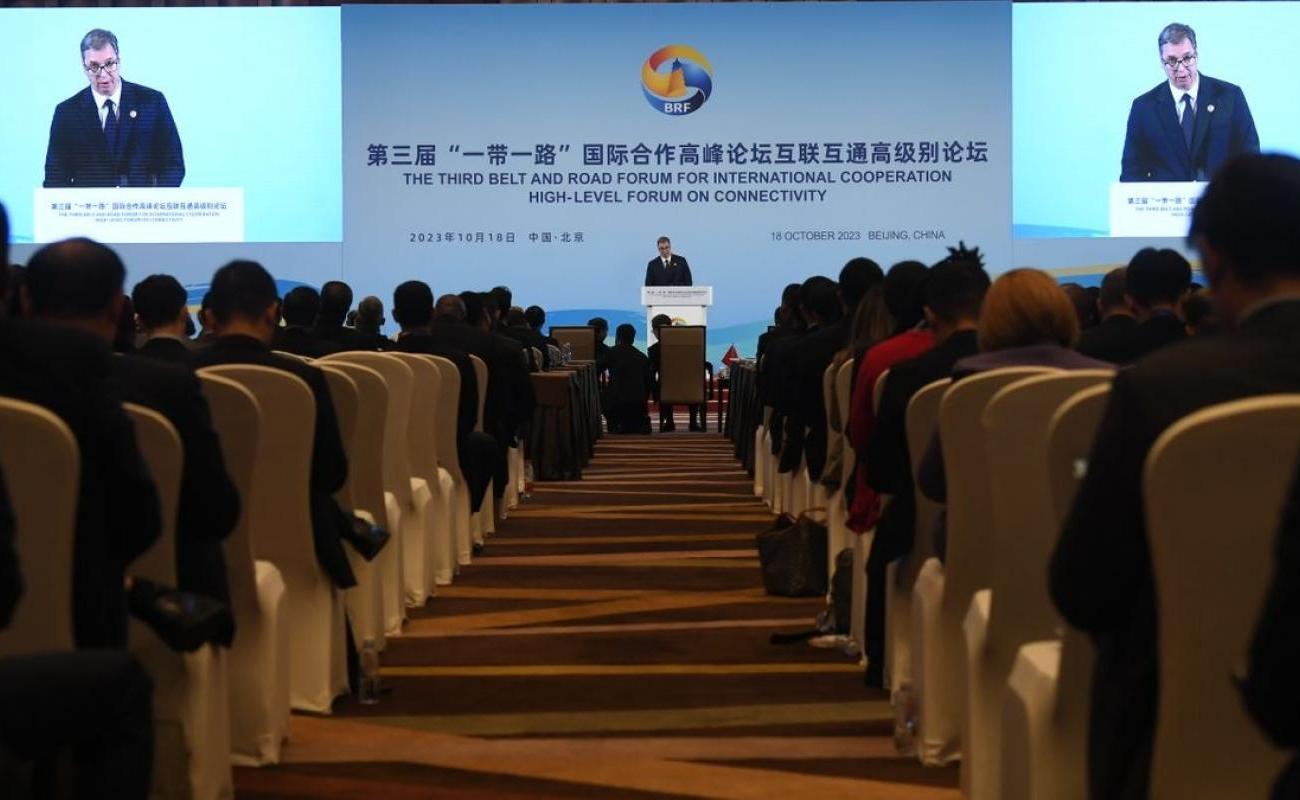Serbian media present cooperation with China as Serbia’s alternative to the West

The third Belt and Road Forum for International Cooperation held on 17 and 18 October in Beijing attracted significant attention in Serbia. Part of the media presented China as Serbia’s alternative to the West, while the summit produced narratives about the new emerging multipolar world order in which China will have one of the dominant roles.
Despite the exaggerated reporting, China’s Belt and Road Initiative in reality faces challenges and open questions about its future reach. The current assessments of the experts are that megaprojects within the Initiative are mostly over and that the second decade of the Belt and Road will not look like the first ten years.
The expected rebranding of the Initiative already began at the Beijing Summit. China will seek to encourage new potential for the Belt and Road Initiative by continuing to strengthen support in the Global South, hoping to counterbalance the US-led international order. The outcomes, however, are far less certain than presented to the Serbian public.
How did the Serbian media report on the summit?
The central guest of this year’s Belt and Road Forum was Russian President Vladimir Putin. This was Putin’s first official visit outside the post-Soviet space since the beginning of the Russian aggression against Ukraine in 2022. The most influential Serbian pro-government tabloid Informer focused in particular on the increasingly tight political, economic, and military cooperation between China and Russia as an alternative to the US-led order.
Tellingly, the media outlet that most frequently promoted the narrative of a new emerging international order centered on China was the Serbian edition of Russia Today. In a series of articles, RT indicated that the “international community is gathering around Beijing,” that “the West cannot match the development projects of the East,” how the “Chinese model of development worries the Western elites” and how the “world voted with feet on a referendum on the Belt and Road”.
Another related narrative was that Serbia, as one of the few participants from Europe, is becoming a “steel friend” of China and that its international position – a “sovereign” and “independent” policy – is being improved with Chinese support. During the Forum, the Serbian delegation signed a series of memoranda of cooperation, new loans for infrastructure projects were agreed upon and the announced Free Trade Agreement with China was concluded.
The pro-government Informer published a large number of articles emphasizing the friendship between China and Serbia, the two presidents Xi and Vučić, as well as the “historical significance” of the Serbian delegation’s visit to Beijing. Analysts emphasized that China is the leading power in the world, that it offers Serbia cooperation, stability, and economic prosperity, and that, in China, Serbia has an alternative to conditioning and sanctions from the West.
In its detailed analysis of the Belt and Road Summit, pro-government Večernje novosti emphasized that “this gathering was perhaps even more important than the UN Assembly and…everyone witnessed China’s support for Serbia.” It is added that Serbia is China’s most reliable partner on European soil and that it can continue its “policy of sovereignty without accepting blackmail.”
The Serbian service of the Russian Sputnik reported in a similar tone. In addition to the assessment that Serbia has received “incredible attention” in Beijing, Sputnik also states that the signed agreements are an excellent opportunity for Serbia and its economy. It is predicted that Serbia “finds its place in the changes taking place in the world,” whereby the principle of mutually beneficial cooperation followed by China suits Serbia, in contrast to the “Western neo-colonial approach.”
Open questions about the scope of the Belt and Road Initiative and its economic benefits for Serbia
Despite the confident reporting of the Serbian media, the ambitions of the Belt and Road Initiative are not without obstacles. Council on Foreign Relations recalls in its analysis that the absence of European and EU leaders was noticeable, emphasizing the growing European skepticism towards Beijing. On 7 December, the Government of Italy confirmed it would exit the Belt and Road initiative.
Also, data shows that the combined value of overseas investment and construction projects in the Belt and Road countries fell by 44% compared to their highest level in 2018. The umbrella Chinese venture began to slow down.
Carnegie Endowment for International Peace writes that the “momentum of this gala initiative” has stalled due to domestic economic problems that have placed restrictions on borrowing and investment abroad. Financial difficulties have begun to outpace China’s hoped-for diplomatic gains, and a 2021 study confirms that over 35% of projects under the Belt and Road Initiative ran into implementation problems, caused by corruption, excessive debt, or labor exploitation.
Regarding the positioning of Serbia, the questions arise about the long-term benefits. Serbia is one of the most important participants in the Belt and Road initiative in the Balkans, but the projects have been accompanied by numerous controversies in previous years, and the broader global challenges facing the Chinese initiative should also be taken into account.
The signed Agreement on free trade between Serbia and China can manifest its full effects only in five to seven years. Economists estimate it will bring very asymmetric effects, and that the Serbian economy can only offer little to the Chinese market. Last year, Serbia imported goods worth 4.98 billion dollars from China, while exports from Serbia were four times smaller, i.e. worth 1.17 billion dollars. It is also illustrative that the three largest exporters from Serbia to China were Chinese companies – Zijin Mining, Zijin Copper and HBIS Group.
Additionally, Serbia will have to terminate that agreement before joining the European Union since EU membership is not compatible with individual arrangements on free trade.
